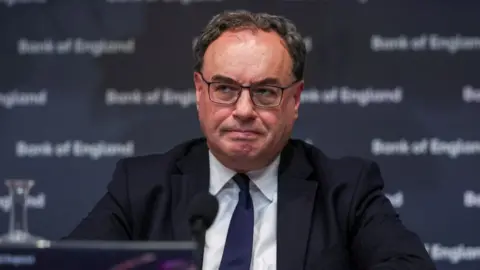Bank of England: We must see job through to cut inflation
 Getty Images
Getty ImagesThe governor of the Bank of England has said it is "crucial that we see the job through" to slow soaring prices in a speech to the world of finance.
Andrew Bailey said reducing inflation to 2% is "so important" as people "should trust that their hard-earned money maintains its value".
Currently, inflation, which is the rate prices rise at, is 8.7% - more than four times the Bank's target of 2%.
Chancellor Jeremy Hunt said government would work to cut inflation.
"We will do what is necessary for as long as necessary to tackle inflation persistence and bring it back to the 2% target," Mr Hunt said at the start of his first Mansion House speech as chancellor.
About 400 people from the financial and business industries attended the dinner at the 18th Century building, which is the official residence of the Lord Mayor of London.
It comes at a time when businesses, as well as households, are being hit by higher costs due to inflation remaining stubbornly high in the UK.
Mr Hunt suggested companies should show restraint on profit margins, adding "margin recovery benefits no-one if it feeds inflation".
The Bank of England has steadily been increasing interest rates in a bid to combat inflation.
Its base rate - which has a direct effect on borrowing costs for things like mortgages and credit cards, but also influences savings rates - is now 5%, up from close to zero 18 months ago. Some analysts have predicted interest rates will peak at 6.5%, but some have said they may rise to as high as 7%.
The theory behind raising interest rates is that by making it more expensive for people to borrow money, and more worthwhile for people to save, people will spend less, which will in turn lead to price rises to slow.
Inflation proving 'sticky'
Mr Bailey said in his speech to executives at the same Mansion House event "it is crucial that we see the job through, meet our mandate to return inflation to its 2% target, and provide the environment of price stability in which the UK economy can thrive".
He added that while the UK economy has failed to grow beyond its pre-pandemic level, there had been "unexpected resilience" in the face of external shocks, such as Covid and the war in Ukraine, with low levels of unemployment and avoiding a recession to date.
But the Bank of England's boss highlighted that "tightness" in the labour market, with many businesses struggling to find enough workers, has contributed to price inflation being "more sticky than previously expected".
"Both price and wage increases at current rates are not consistent with the inflation target," he added.
The Bank of England has previously warned big pay rises are contributing to the UK's still-high rates of inflation, but there have also been accusations that some sectors have been profiteering by overcharging customers.
Last week, the Competition and Markets Authority revealed supermarkets had sought to increase profits from selling fuel, increasing their margins by 6p per litre on average between 2019 and 2022.
Pension reforms
The chancellor said "delivering sound money is our number one focus", before he delivered his speech focusing on plans for pension fund reforms.
Mr Hunt pledged the plans could provide a £1,000-a-year pensions boost to the typical earner who starts saving at 18.
While UK pension pots are the largest in Europe, worth £2.5trn, defined contribution schemes currently invest 1% in unlisted equity, limiting returns for savers and funding for businesses, the Treasury has claimed.
The chancellor revealed an agreement with leading pensions firms to put 5% of their investments into early-stage businesses in the fintech, life sciences, biotech and clean technology sectors by 2030.
The so-called "Mansion House Compact" has been backed by Aviva, Scottish Widows, Legal & General, Aegon, Phoenix, NEST, Mercer, M&G and Smart Pension.
Ahead of the event, Mansion House organisers said talks had taken place about security at the venue over concerns of protests. A source told the BBC the event was not disrupted.
